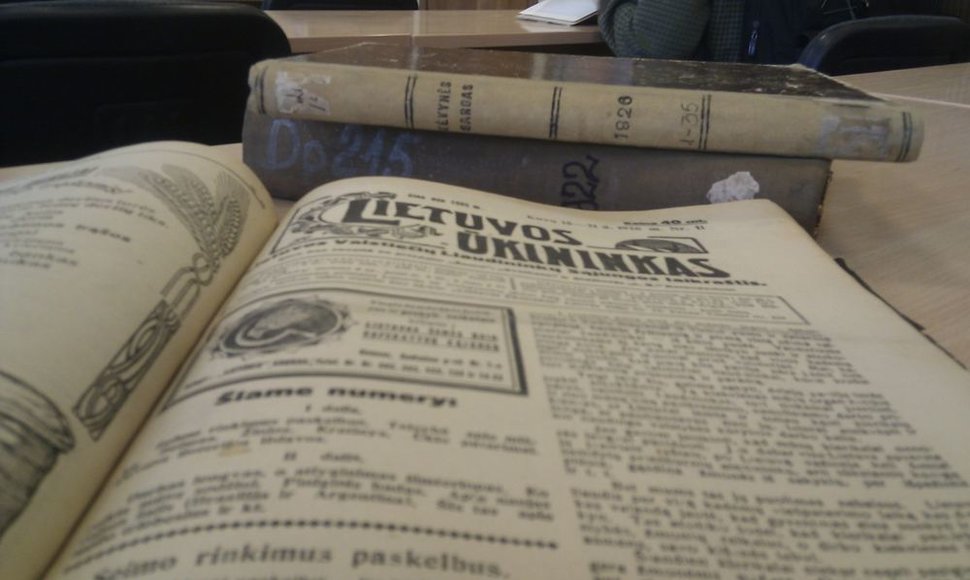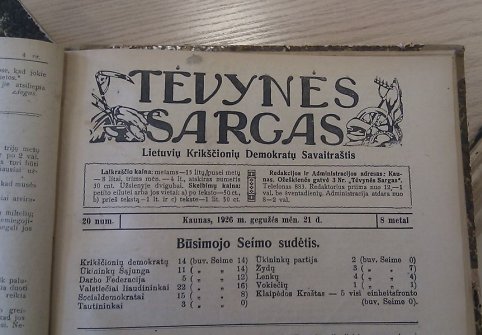Elections to the Constituent Seimas took place in 1920 and a glance at the contemporary press reveals a heated election campaign and problems quite similar to today's.
Fierce frictions erupted between the Christian Democratic Party and the Lithuanian Peasant Union – the two criticized each other using high rhetoric as well as “black technologies” of the day.
Press in inter-war Lithuania was essentially partisan, so many of the campaign clashes took place on paper – the Christian Democrats published their “Homeland Watch” (“Tėvynės sargas”) while the Peasant Union had its “Lithuanian Farmer” (“Lietuvos ūkininkas”). While reading their yellowed pages from 1920, 1922, and 1926 – the election years – one cannot help feeling that not much has changed.
Hell and boiling oil
On 12 January 1920, the presidential decree set an official date for a vote – 14-15 April – and thus launched an election campaign.
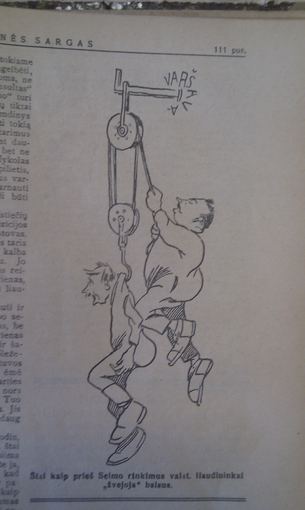 |
| Dovilės Jablonskaitės/15min.lt nuotr./The captio reads: This is how Peasant People's Union is "fishing" for votes. |
All Lithuanian political parties – save for the underground Communist Party which boycotted the election – competed for seats in the Constituent Seimas (which had to adopt a constitution for a newly-independent country), including national minority organizations and other political, ideological, or even ad hoc groups. The candidate list contained 31 organizations.
The most heated fight erupted between the Christian Democrats and the Peasant Union. “Without delaying for a single day, let's flock to the only organization of working people – the Peasant Union. Otherwise, we will be ruled by clerics and their henchmen,” an announcement reads from the 8 February edition of the “Lithuanian Farmer.” Another issue adds: “Separating the Church from the state will affect priests' purses and decrease their influence in public life.”
Another article, published after the Peasants' convention of 15 February, warns that priests are not sitting idle either: “Squads of the Lithuanian Peasant Union have to hold four fronts almost everywhere. Firstly, all priests without exception have declared war on the union. Some representative tell us with tears in their eyes about the dirty tricks that priests revert to – even threatening to refuse to hear confession in order to undermine independent action of the peasant organization.”
The paper publishes readers' letters, telling how “priests are using God's word for party interests and have turned the church into a bazaar.” Even the confessionals are used as leverage: “Priests in many places are asking people during Easter confessions if they are not members of the Peasant Union or socialist people's democrats, frightening them and dissuading, some even refuse to give absolution,” alleging that “all socialists will go to hell after death and drink boiling oil.”
The Peasant Union urges people to be alert and not succumb to the “divide an conquer” game of the Christian Democrats: “Priests and their accomplices have lately set up all kinds of traps: the Christian Democratic Party, the Agriculture Union, the Farmers Union, the Labour Federation, then a dozen of organizations like 'Spring', 'St. Joseph', 'St. Casimir', 'St. Zita' and all sorts of other names. Why are they trying to lure us? In order to divide and fool us.”
Meanwhile the Christian Democrats bemoan in the “Homeland Watch” that the school and teachers have given in to the left.
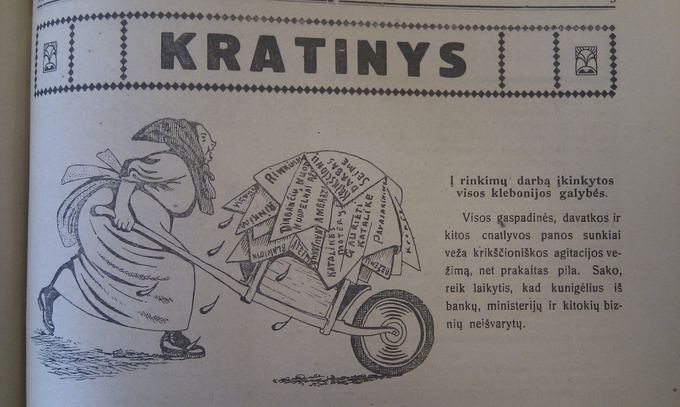 |
| Dovilės Jablonskaitės/15min.lt nuotr./Political cartoon, saying how "prudes" and devout "spinsters" are driving the load of Christian political campaigning. |
“Many regard the school as a perverting institution. Left-leaning teachers do their work and in order to achieve their goals, they resort to bold measures. Teachers, who make up only a small fraction of the society, who know A and B, are claiming the right to lead a child of believing parents along their own path, put him on the slippery road of godlessness?” the paper's columnist asks.
Close contacts with the Catholic church, sermons from the pulpit, urging people to not vote for “infidels” and “ciciliks” (socialists) helped the Christian Democratic Union win the elections to the Constituent Seimas, where they and ideologically close organizations – the Lithuanian Farmers Union and the Lithuanian Labour Federation – claimed almost 53 percent of the seats.
Second was a block consisting of the Lithuanian Socialist People's Democrats and the Lithuanian Peasant Union (the two merged in 1922 to form the Lithuanian Peasant People's Union) with one fourth of the vote.
No friendships with landlords
Electioneering began again on 7 August 1922, with the announcement of the date for the election of Lithuania's first ordinary Seimas, 10-11 October. This time, campaigning was more thought-out, measured, and argued. Politicians did not only appeal to emotions but could also quote actual accomplishments or failures in running the young state. In other words, the nation had already experience what they were dealing with and it was time for retribution.
“We were concerned with state affairs, while our opponents only with their party's. We have written time and again that the [National] Progress [Party] and the Farmers [Party] are the only hope for landlords to keep their estates. Therefore, as the new elections approach, one must be watchful and alert that landlords cannot walk on our heads to the Seimas and then put chains on the entire country.
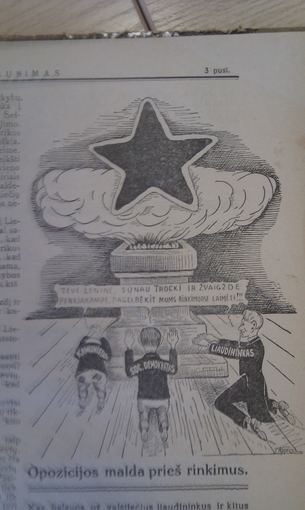 |
| Dovilės Jablonskaitės/15min.lt nuotr./"Opposition's prayer before the elecetions" |
“Sure, as they address the people, they will speak in sweet voices, they will know how to scorn the Seimas, the government, they will point – this is bad, this is wrong, etc. Eventually, they will put all blame on the Christian Democrats. But each one of us, as we go to the polls, must remember [a fairy tale about] how the fox cheated the rooster into coming down from the tree to take a walk. Remember the lesson taught by our grandparents: Don't go picking nuts with the Devil, don't be friends with the landlord,” the “Homeland Watch” instructs its readers.
The paper insists that socialists came to power in order to destroy, not to build, describing how leftist deputies disturb parliamentary sessions that discuss legislation to do with the Church and religious education.
“It would be possible to work together with decent, wise people who think for themselves, but no serious work is possible with the likes of Christian Democratic deputies who only use reason that comes via Jesuits from the black centre of Kaunas priests,” the opposition retorts in its own paper, urging readers to disbelief talks that the Seimas is doing a bad job and delays are only socialists' and the Peasant Union's fault.
Stuffing their purses
“Agitators of some parties... use incredibly vicious lies in their agitation. And only actual work done by those parties can set the record straight. One must not elect the Social Democrats, Socialists, Peasants, and Farmers with the Progress [National Progress Party], because they go against interests of Lithuania and its people,” the Christian Democrats try to open voters' eyes.
Meanwhile the Peasant Union urges readers of the “Lithuanian Farmer” to judge the ruling parties not by their words but by their deeds: “In the three years that the Christian Democrats ran the country, they sunk us into great hardship, they failed to bring order, only the Christian Democratic leaders got rich by establishing banks and other acquired companies, buying up land, etc. They will promise you heaven on earth if that helps then get into the new permanent Seimas. But while in the majority, they did not bring relief to the common man, they only care about stuffing their purses. They were ready to rob entire Lithuania just to stuff millions into their pockets.”
One month before the elections, the opposition pleads the nation to make sure that the new Seimas has fewer prudes, organists, and sextons.
Association drive
As the 1922 elections were approaching, parties were doing their best to appeal to voters and lure the electorate.
The Christian Democrats, realizing that slogans referring to God had run out of steam, pulled out another ace from up their sleeve – they addressed the society with an announcement of setting up a new association called “Hope”: “Our Catholic society cannot remain indifferent when the young generation is being pulled into that movement, when they are forced to serve foreign gods in the guise of liberalism, atheism, socialism. Therefore, a new association is to be set up in Šiauliai in order to materially support studies of penniless and virtuous youth.”
Read – if you want education, you know how to vote.
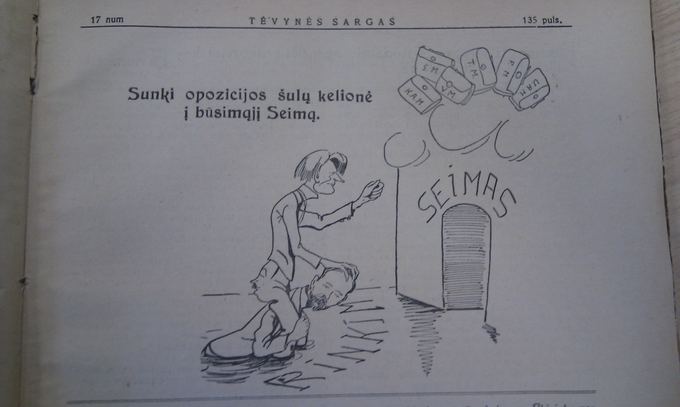 |
| D.Jablonskaitės nuotr./"Hard journey of the opposition to the future Seimas" |
Their opponents did not waste time either: on 17 August, they set up the Lithuanian Women's Union. One of its board members was Felicija Bortkevičienė, editor of the “Lithuanian Farmer,” the greatest enemy and destroyer of faith, according to the Christian Democrats.
The Christian Democratic Party called the association a rope on a woman's neck. “All infidels and socialists regard women as men's playtoys, tools for their amusement. They do not wish to grant women the value of human being. Where they have power in their hands, they do not give women equal rights. Thanks to the Christian Democratic Party, women have become equal citizens. Socialists, seeing they will not be able to hold women in slavery, now masterminded to put the socialist rope upon them, namely, to set up a 'cicialist' women's association, so they can use it to advance their goals, especially to steal more votes from unknowing women.”
In reply, the “Lithuanian Farmer” reminds one week before the vote that “The Farmers' Union is just a guise for those same Christian Democrats. But as they are completely bankrupt, they came up with the Farmers' Union and now use this new creation to fish out votes of farmers and small land owners.”
Poetry failed
With the elections in sight, the “Homeland Watch” dots the i's, in rhyme: “If you side with peasants and progress,/They will halter you at once!/Away with 'ciciliks', we don't need them/Their red flags are tainted with blood./If you elect a 'peasant', you will regret for sure/The landlord estates will continue flourish./And 'progress', brother, is their kindred spirit/Even though today it might seem quite pleasant./We will all vote for the Christian bloc,/All free citizens of our free homeland!”
However, poetry could not save the party this time. Despite vehement support from the Catholic Church, the ruling Christian Democratic Party failed to secure the majority in the Seimas. With 41 percent of the vote, the party got 38 seats, a little under a half. Leftist parties – the Lithuanian Peasant Peaple's Union and the Lithuanian Social Democrats – retained their previous positions. The elections spelled the greatest defeat to national minority parties that failed to join forces and ran separate candidate lists instead of one. The biggest surprise in the first Seimas (1922) was a 5-member parliamentary group of the Communist Party that ran in the elections under the name of the Workers' Company.
Disagreements led to the President dismissing the Seimas on 12 March 1923, after only 4 months of work. The second Seimas was to be elected on 12-13 May.
The Christian Democratic Party threw all their resources into the campaign and, with the backing of the Church, secured a few additional seats. They now had an absolute majority, making the second Seimas the only one that lasted through the entire 3-year term.
Exploiting crisis
The Christian Democrats, who governed the country since spring 1920, suffered a number of scandals over lavishing public money on Catholic organizations and agencies as well as corruption cases exposed by the opposition.
Besides, believers had a problem with priests engaging in politics, actively participating in the party, in campaign bickering. The ruling party's authority suffered another blow when an economic crisis started to be felt in 1924.
Therefore securing majority in 1926 was a difficult tax. But the Christian Democrats employed all means at their disposal to do it.
The tone and rhetoric of election campaigning changed significantly: both pro-government and opposition papers now printed mocking cartoons and threats of the bogeyman of socialism.
“The kadem (Christian Democratic) agitators are lying when they say that the Peasant People's Unio wants to abolish marriage, baptism, and all other religious ceremonies. The kadems lie that the Peasant People's Union are socialists,” the “Lithuanian Farmer” insists.
The governing Christian Democrats accuse the opposition of destructiveness: “Our opposition, especially the People's Union, their papers, and [first president Antanas] Smetona and [Augustinas] Voldemaras are working overtime and shouting that Lithuania is allegedly in a great economic crisis, that the Christian Democrats are going to declare dictatorship, etc.
“These inflated so-called facts about the crisis, these indecent inventions about a dictatorship, and all other false information are fed to foreign press which is thus deceived by our opposition. People's Union and Smetona's supporters should have enough good sense to realize that this false information undermines our affairs abroad. The opposition, set on winning the elections, forgets state interests; by smearing the ruling parties it also smears and humiliates the state itself and the entire nation.”
The Peasant People's Union, meanwhile, does not neglect to mention the loan taken out by the state: “A month ago, the entire kadem press trumpeted the 'joyful' news that the foreign loan already arrived. Even Finance Minister Karvelis boasted about it in one rally. But the 'joyful' announcement was followed by a no less 'joyful' silence. Today, judging by the fact that our officials say nothing about the terms, we can only assume that the terms are hard on us, that they are nothing to boast about."
The government, in turn, call the entire criticism a lie. “The Peasant People's Union, having spent three years idling and only hampering those who worked, decided to fish out some votes for themselves. They opened their barrel of libel and spilled all the smear and fiction, all gossip to the people. Agitators, hired on someone's money, started touring villages and smearing the government, Catholics, and the Church.”
Best intentions can amount to nothing
The 1926 Seimas election was a major turn in the history of Lithuanian parliamentarism. The Christian Democrats lost elections to the third Seimas. Their share of the vote dwindled and so did their number of seats in parliament. For the first time, victory went to the left.
Coalition of the Lithuanian Peasant People's Union and the Lithuanian Social Democratic Party did not have a majority, but by securing support from national minority deputies, they were able to form the Government.
This was a blow below the belt for the Christian Democrats. Right after the elections, on 21 May, the “Homeland Watch” editorial read: “In terms of statehood, the Seimas election results are bad. In order to be in the position, the People's Party will have to agree with the Social Democrats and also some minorities. Experience in other countries as well as our own shows that deals and concessions cost parties a great deal. Under such deals, one or two deputies can cast their veto at any minute and, disagreeing with the opposition, the best of intentions can amount to nothing.”

